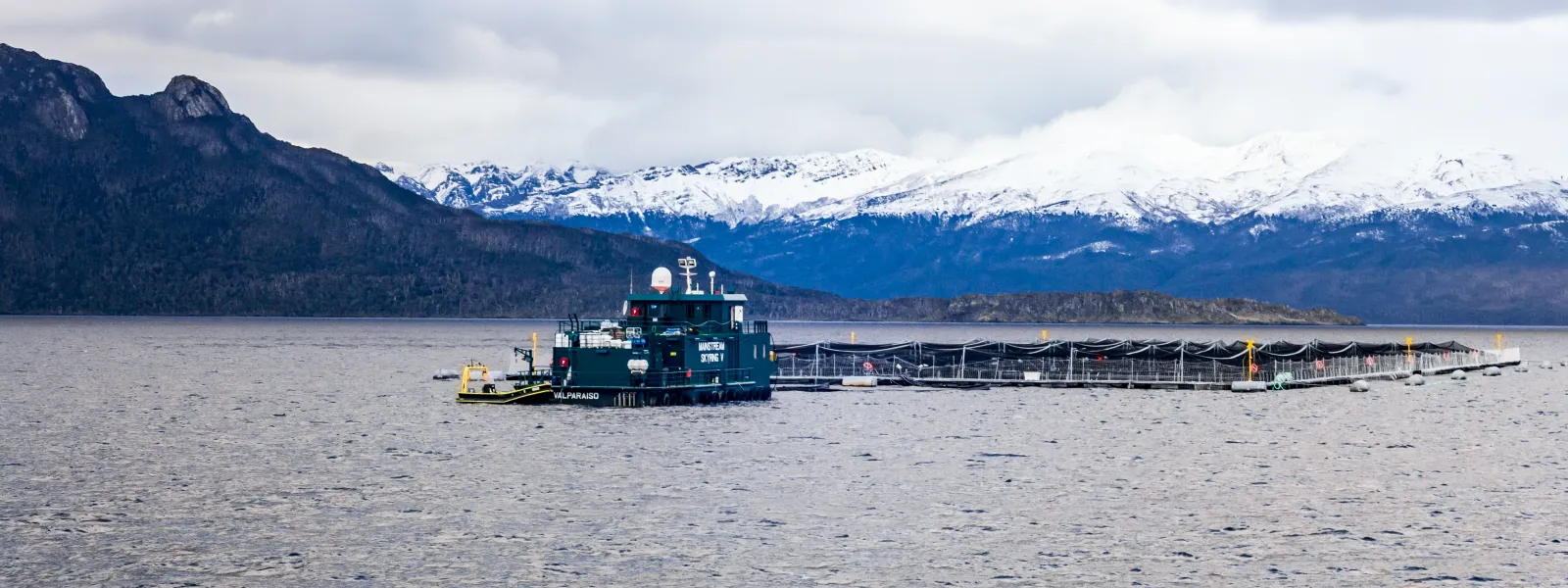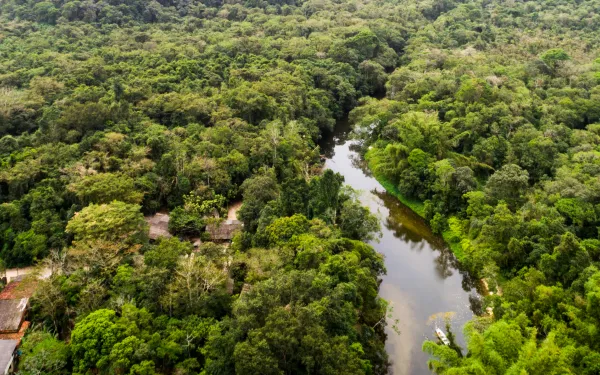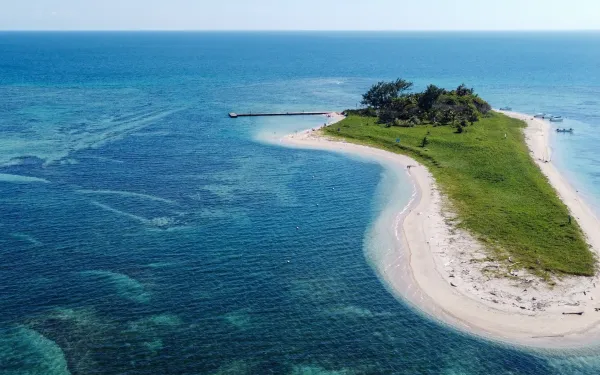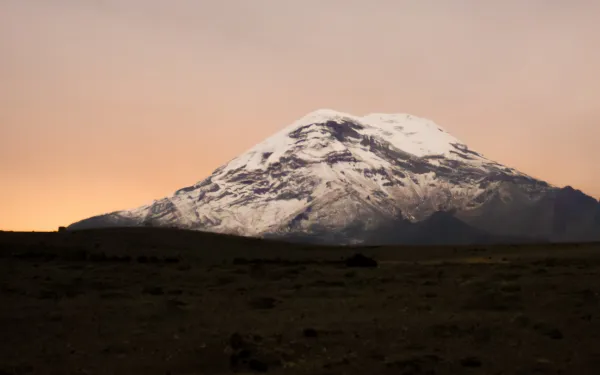
Project
Photo: #RealChileProtecting Patagonian Seas from Salmon Farms
The Straight of Magellan in Chilean Patagonia (or Magallanes, as it’s known in Spanish) hosts the largest number of natural protected areas in the country. Permanent snow feeds the idyllic landscape, which has been shaped by glaciers, lakes, rivers and seas. Within its bounds live protected species—blue whales, sperm whales, Magellanic penguins, elephant seals, leatherback turtles, and southern and Chilean dolphins.
The cold waters of this far corner of the world are pristine; this makes them more sensitive to high-impact human activities. And now they’re being stressed by the arrival of salmon farms, which have already caused severe environmental damage in regions further north.
In Chile, the salmon industry uses harmful techniques and operates without proper regulation. Its rapid growth has overwhelmed coastal waters, filling them with huge amounts of antibiotics, chemicals, and salmon feces. These pollutants have led to partial or, in some places, complete lack of oxygen in the water, threating all forms of marine life.
Large salmon farms in the Magallanes region are already causing big damage. According to a government audit, more than half of the salmon farms operating there are affecting the availability of oxygen in the water, a condition that did not occur prior to their arrival.
Partners:

Related projects

Peru’s Constitutional Court to hear case on Amazonian oil spills
The Court expects to resolve an amparo that communities of the Peruvian Amazon filed requesting the maintenance of the Norperuvian oil pipeline to prevent further spills. The lawsuit was supported with arguments on the international obligations of the Peruvian State to guarantee the rights to a dignified life and a healthy environment, among others. Lima, Peru. The Constitutional Court can stop the oil spills in the Peruvian Amazon and, with them, the systematic violation of the fundamental human rights of the indigenous peoples who live there. On Thursday, March 4, the Court is scheduled to hear and resolve an amparo filed by community members from Quebrada de Cuninico, Urarinas district of Loreto province, demanding the maintenance of the Norperuano oil pipeline, which would prevent new spills. In 2014, due to a leak in the pipeline, 2,500 barrels of oil were spilled into the creek, which negatively impacted the health and natural environment of the native communities of San Francisco, Nueva Esperanza, Cuninico and Santa Rosa. The unconstitutional amparo, filed in June 2018 with support from the Instituto de Defensa Legal (IDL), seeks a final judicial decision requiring the state-owned company Petroperu to oversee and monitor the operations of the Norperuvian Pipeline, the longest in the country, as well as to maintain all its pipelines in safe working order to prevent further spills. "It is urgent that the Peruvian authorities put an end to this structural problem that has affected the Peruvian Amazon for decades," said Juan Carlos Ruiz, IDL's lawyer. Recently, the Interamerican Association for Environmental Defense (AIDA) presented an amicus brief supporting the communities’ demand, using international human rights law to outline the State’s obligation to guarantee the adoption of administrative, legal, political and cultural measures necessary to protect the rights to a dignified life and a healthy environment. "The Amazon is an indispensable ecosystem for conserving the planet's climate," said Liliana Avila, coordinator of AIDA's Human Rights and Environment Program. "In contexts of climate crisis, the protection of this ecosystem and the indigenous peoples who inhabit it is an urgent and vital mandate." The brief also highlights the toxicity of oil to the environment and the duties of the Peruvian State and Petroperu to guarantee the health and integrity of those most vulnerable to hazardous substances, such as children, women and traditional communities. "There is evidence that the oil spills in the Peruvian Amazon, which directly affect indigenous peoples, are mostly caused by the corrosion of pipelines," says Connie Espinoza, Regional Technical Coordinator of the All Eyes on the Amazon Program (TOA). "The volume spilled is so large that se are finding it impossible to attend to all the remediation needs derived from each and every spill." According to The Shadow of Oil, an OXFAM report, pipeline corrosion and operational failures caused 65 percent of the 474 spills that occurred in Amazonian oil lots and in the Norperuvian Pipeline between 2000 and 2019—which affected the territory of 41 indigenous peoples—, while third parties caused just 28 percent. Pipeline operators are responsible for the vast majority of spills. The document also shows that, of the 2,000 sites impacted and contaminated by oil activity in Block 192, only 32 were prioritized for remediation, and that the volume of contamination, on average, would fill 231 national soccer stadiums. The lack of maintenance of the Norperuvian oil pipeline gravely impacts the Peruvian Amazon and violates the fundamental rights of native communities to enjoy a balanced environment, health, physical integrity, natural resources, territory and other rights of constitutional importance. press contacts: Gerardo Saravia, IDL, +51 997 574 695, [email protected] Nora Sánchez, HIVOS, +593 99 821 5617, [email protected] Victor Quintanilla, AIDA, +521 5570522107, [email protected]
Read more
Reaffirming the legitimate protection of the right to a healthy environment
In December 2016, two women from Veracruz decided to defend the Veracruz Reef System in court. They sought to protect the largest coral ecosystem in the Gulf of Mexico from the expansion of the port of Veracruz, which would cause serious and irreversible impacts on the reef’s biodiversity and, by extension, the local population. Residents of the Veracruz metropolitan area, represented by the Centro Mexicano de Derecho Ambiental (CEMDA), filed an injunction against the project because its environmental permit resulted from a fragmented impact assessment that did not consider the full range of risks to the reefs. AIDA supported our partners at CEMDA by filing an amicus brief with detailed information on the important services the reefs provide: sequestering carbon, generating oxygen, producing food, and protecting coastal areas from storms and hurricanes, among others. In April 2017, the court that heard the case rejected the injunction and, with it, the request to suspend work on the port expansion. The court argued that the plaintiffs failed to demonstrate that the project had "a real and relevant impact" on their rights and that they lacked a "legitimate interest" in the case. Legitimate interest—also known as legal standing—refers to a person’s capacity to claim damages before a court of law, in any scope. In a traffic accident, for example, only you have the legitimate interest to claim the damages your vehicle may have suffered, which must be individual and quantifiable. However, in matters of environmental damage, the situation is more complex. The degradation of an ecosystem affects more than one person and even transcends generations. The residents of Veracruz appealed the judicial setback and their case arrived before Mexico’s highest court, the Supreme Court of Justice of the Nation. Given the lower court’s limitations in recognizing in its ruling the right of all people to equal access to justice in environmental matters, AIDA and Earthjustice filed a second legal brief before the Supreme Court, requesting an expansion of the requirements for legitimate interest. We provided legal and technical evidence regarding the human right to a healthy environment and access to justice, enshrined in international law. These rights mean that the Mexican government must ensure that anyone whose fundamental rights are threatened by environmental degradation has the possibility of achieving justice, regardless of whether their connection to the threatened ecosystem is indirect or remote. The Environmental Law Alliance Worldwide also contributed a brief that analyzes court decisions from various jurisdictions recognizing the right of any person, civil society organization, or local resident to file lawsuits against projects and decisions that may negatively affect the environment. Finally, on February 9, 2022, more than five years after the original lawsuit was filed, the residents of Veracruz won an important victory for the area’s reefs. In a unanimous decision, the Supreme Court found that government authorities violated the right to a healthy environment of the people of Veracruz by authorizing the port’s expansion. Since it was unopposed, the ruling creates a binding precedent for all courts of the nation. The Veracruz decision is a landmark ruling, valuable for not just Mexico but for the entire region because it: Ratifies that proximity to a project does not define who the affected people are or who can claim protection of their right to a healthy environment before the courts. Reaffirms that it is not necessary to prove quantifiable and individualized damage in order to have access to environmental justice; it is sufficient to demonstrate that a project or activity, by degrading an ecosystem, damages or threatens to cause damage (economic, social, cultural, health, etc.) to a community. Recognizes an expanded legitimate interest, as well as the collective nature of the right to a healthy environment and public participation in environmental assessment processes. Sets a precedent with the capacity to transform the way in which environmental impact assessments are carried out in Mexico, incorporating the principles of prevention and precaution. Points to Mexico's international obligations, including those acquired under the Regional Agreement on Access to Information, Public Participation and Access to Justice in Environmental Matters in Latin America and the Caribbean (Escazú Agreement). As an organization and individuals, we are celebrating this important step toward strengthening the defense of the right to a healthy environment in the region. We are proud to have contributed to this achievement, and hopeful that the implementation of the ruling will be carried out according to the highest standards.
Read more
Climate litigation in Latin America and the Caribbean: Launching a regional platform
By Maria Antonia Tigre, Florencia Ortúzar and Javier Dávalos* With the largest rainforest in the world, the largest freshwater reserves on the planet and the most significant amount of arable land where food is produced, the importance of Latin America and the Caribbean in the fight against climate change is undeniable. Unfortunately, however, the region is also highly vulnerable to the damaging effects of the climate crisis, despite not being significant emitters of greenhouse gasses. As a result, human and environmental rights are being threatened in a context where defenders are constantly at risk. Sadly, the region has been recognized as the most dangerous for environmental and human rights defenders. Strategic climate litigation has slowly grown in the region as a critical tool to complement the work for the defense of the environment, the territory, and the protection of the rights of peoples and communities. Litigating in the Global South and Latin America is different from litigating in the Global North, with particular challenges that must be addressed strategically. Cases in some of the most dangerous countries for environmental defenders might render them more vulnerable to attacks and threats. A lack of resources might leave plaintiffs, who bravely stand up for the cause, unprotected, and not only from violence but from subtler maladies, such as emotional stress or stigmatization. Another huge obstacle is the grave corruption that affects the region, which implies excessive power for extractive companies. Corruption is a widespread and deeply rooted phenomenon, especially in multimillion-dollar industries such as fossil fuels and extractivism. There’s a risk that companies or governments might co-opt academics, and proving and battling corruption is extremely difficult and dangerous. Finally, one of the most severe obstacles to making climate litigation effective in Latin America and the Caribbean is the difficulty litigators face when implementing favorable decisions. LAC presents some encouraging but at the same time alarming statistics around climate litigation. Although the vast majority of cases that have been resolved so far have had favorable decisions, the implementation of these has, so far, been unsatisfactory. There is much to be done on this front, including identifying administrative deficiencies of States that influence the difficulty of enforcing decisions; and considering, from the planning stage of cases, which remedies are sought and how implementation will be demanded. Despite these challenges, climate litigation is already showing the power it beholds in promoting change. In Peru, a group of young people sued the government for failing to formulate and execute a national policy and plan to curb deforestation in the Peruvian Amazon (Álvarez et al. v Peru). In Colombia, the Wayúu indigenous communities promoted an action to annul the environmental permit of a colossal coal mine (Mina Cerrejon). In Mexico, Greenpeace promoted an injunction to stop atmospheric pollution and improve air quality in the State of Mexico (Greenpeace v Secretaría de Medio Ambiente). In Argentina, the Organización de Ambientalistas Organizados demanded that the Ministry of Environment halts the approval of offshore exploration of fossil fuels for its impacts on whales and climate change (Organización de Ambientalistas Organizados v Ministry of Environment and Sustainable Development). In Ecuador, a group of nine girls questions the Ecuadorian State for authorizing oil companies to burn gas in the Ecuadorian Amazon (Caso Mecheros). In Chile, the NGO Defensoría Ambiental sued the government and all the companies operating in an emblematic sacrifice zone for the environmental damage caused after years of operations (Daño Ambiental en Ventanas). And these are only some examples. The Climate Litigation Platform for Latin America and the Caribbean has been created in this context. The Interamerican Association for Environmental Defense (AIDA), a regional NGO that uses the law to protect the environment and the human rights of communities, has been leading the effort in close collaboration with regional organizations and litigators who have been behind some of the cases in the region. AIDA launched the platform in a webinar, the recording of the event is available here. The Platform, which is maintained in Spanish, offers information on the judicial cases in the region that use climate arguments in a friendly and intuitive manner. It also includes a section of downloadable resources that might be useful for stakeholders who are planning on using the law to advance their cases. The goal is to promote more cases and better outcomes. Thus, the Platform is a tool to deliver, share strategies, experiences, and arguments on climate litigation, help create and strengthen alliances and facilitate contact between people who work in favor of the environment and climate. This initiative emanates from a collaboration with different organizations. It is a cross-cutting and participatory initiative that feeds on collective work. AIDA’s initiative fits well within the collaborative endeavors of the Sabin Center. In December 2021, the Sabin Center launched the Peer Review Network of Global Climate Litigation to enhance the field of study and practice in climate litigation and ensure broad and equal geographic representation in our Global Climate Litigation Database. The Network includes national rapporteurs who help us ensure the database is comprehensive and up-to-date. In addition, the Sabin Center is continuously partnering with regional initiatives that specifically analyze climate litigation within a national or regional context. As part of this ongoing effort, the Sabin Center has partnered with AIDA to share information and facilitate the exchange between collaborators of the two projects. The launch of this regional Climate Litigation Platform is not only great news for Latin America and the Caribbean but also for the whole active global community that uses the Courts in favor of the planet. Visit the Platform *Maria Antonia Tigre is Global Climate Litigation Fellow at the Sabin Center for Climate Change Law, Florencia Ortúzar is a senior attorney at AIDA and Javier Dávalos is coordinator of AIDA's Climate Program.
Read more